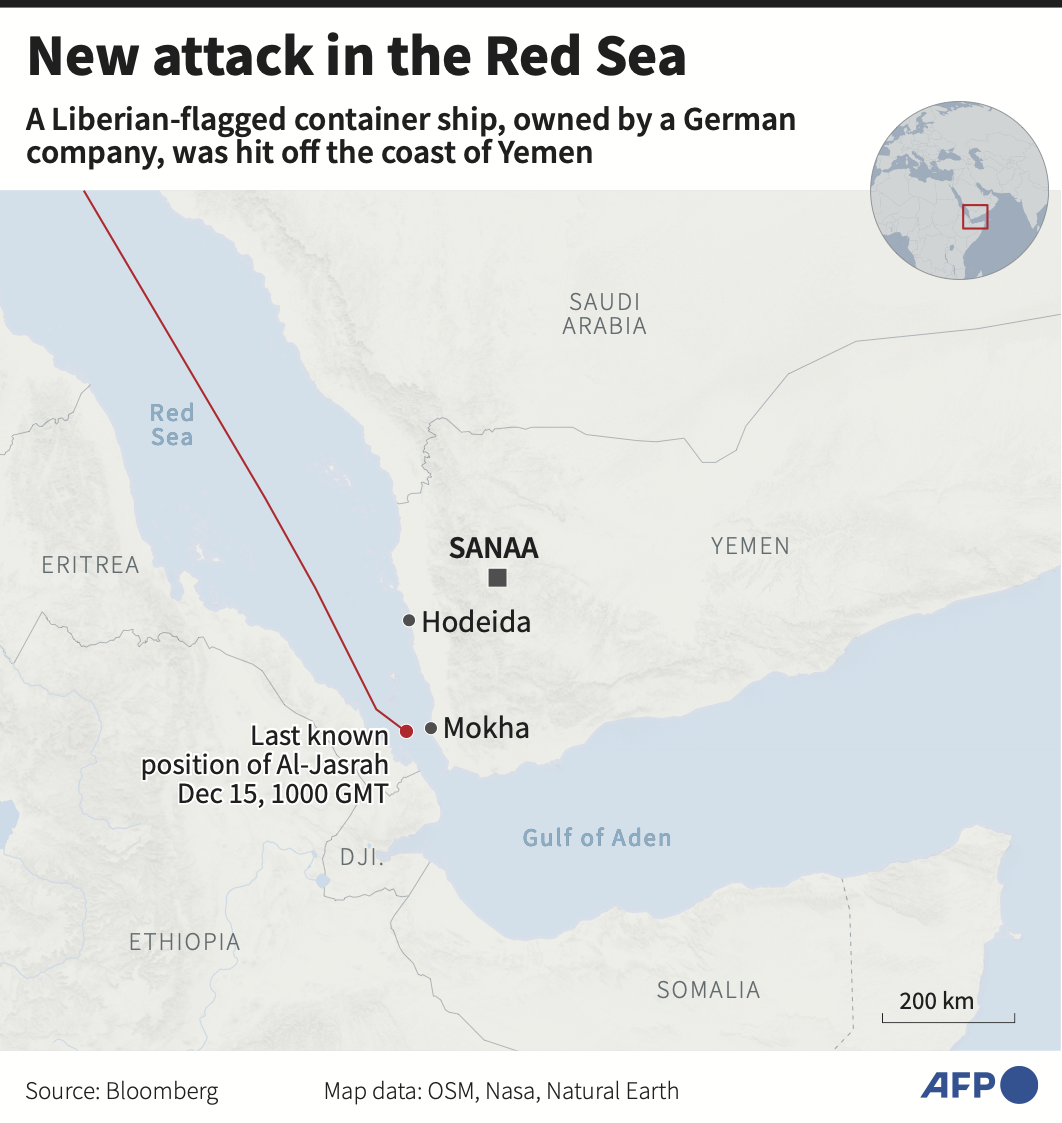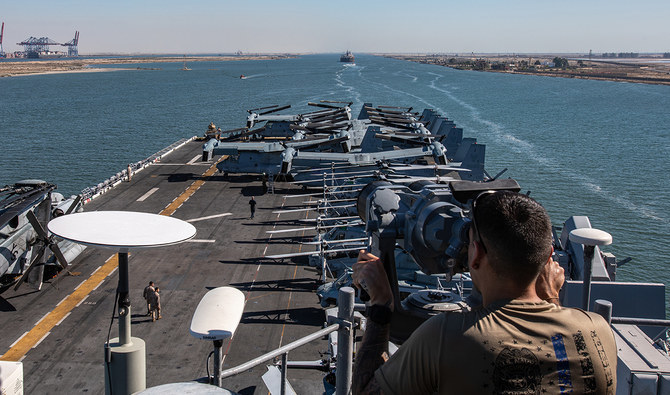DUBAI: A UK destroyer has brought down a suspected attack drone in the Red Sea, defense minister Grant Shapps said Saturday, amid rising maritime tensions in the region.
Britain announced last month that it was sending HMS Diamond, one of its most advanced naval vessels, to the Gulf to shore up its presence in the region.
“Overnight, HMS Diamond shot down a suspected attack drone which was targeting merchant shipping in the Red Sea. One Sea Viper missile was fired and successfully destroyed the target,” Shapps said in a statement posted on X, formerly Twitter.
HMS Diamond, a Type 45 destroyer, is conducting operations to ensure freedom of navigation, reassure merchant vessels and ensure the safe flow of trade, the defense ministry said.
The deployment followed the outbreak of conflict between Israel and Hamas and the seizure of an Israeli-linked cargo vessel by Iranian-backed Yemeni Houthi rebels in the Red Sea on November 19.
The Houthis have launched a series of drone and missile strikes targeting Israel since Hamas militants poured over the border into Israel on October 7, killing around 1,140 people, mostly civilians, according to Israeli figures. Around 240 people were kidnapped in the attacks.
Vowing to destroy Hamas and bring back the hostages, Israel launched a massive military offensive that the Hamas-run territory’s health ministry says has killed at least 18,800 people, mostly women and children.
The Houthi rebels have threatened to attack any vessels heading to Israeli ports unless food and medicine are allowed into the besieged Gaza Strip.

Two of the world’s largest shipping firms, Maersk and Hapag-Lloyd, said Friday they were suspending passage through a Red Sea strait vital for global commerce, after the incidents.
Maersk said this followed a “near-miss incident involving Maersk Gibraltar yesterday” as well as Friday’s attack, in which the rebels struck a Hapag-Lloyd cargo ship in the Red Sea.
A US defense official identified it as the Liberia-flagged Al-Jasrah, a 368-meter (1,207-foot) container ship built in 2016.
Shapps warned Saturday that “the recent spate of illegal attacks represent a direct threat to international commerce and maritime security in the Red Sea.
“The UK remains committed to repelling these attacks to protect the free flow of global trade,” he added.
Royal Navy vessels have been permanently deployed to the region since 1980 and since 2011 have fallen under “Operation Kipion,” the name used for the UK’s maritime presence in the Gulf and the Indian Ocean.
The vessel joined the frigate HMS Lancaster which deployed to the region last year, as well as three mine hunters and a support ship.
“We have instructed all Maersk vessels in the area bound to pass through the Bab Al-Mandab Strait to pause their journey until further notice,” it said.
Yemeni Houthis vow more attacks
Later on Friday, during a pro-Palestinian rally in the Yemeni capital, Sanaa, the Houthis said they attacked two other ships in the area.
“Container ships MSC Palatium and MSC Alanya were targeted by two naval missiles as they were heading toward the Israeli entity,” Houthi military spokesman Yahya Saree said in a broadcast on the rebels’ television channel.
The rebels said that, in an earlier attack, the Maersk Gibraltar vessel was “targeted with a drone and the hit was direct.” According to a US official, the missile missed.
Saree said the attack came after the ship’s crew “refused to respond to the calls of the Yemeni naval services,” and that it was intended as retaliation for the “oppression of the Palestinian people.”
CENTCOM said that the MSC Alanya was only threatened but not struck, while the Palatium was hit by one of two ballistic missiles fired.
In a statement posted December 9 on social media, the Houthis said they “will prevent the passage” of ships heading to Israel — regardless of ownership — if food and medicine are not allowed into besieged, Hamas-ruled Gaza.
On Tuesday, they claimed responsibility for a missile strike on a Norwegian-flagged tanker.
Last month, they seized an Israel-linked cargo vessel, the Galaxy Leader, and its 25 international crew members.
Germany’s Foreign Minister Annalena Baerbock on Friday said the Houthi attacks “endanger not only Israel’s security” but also international shipping routes.
Speaking in Tel Aviv, United States National Security Adviser Jake Sullivan expressed similar concern and said Washington is working with the international community “to deal with this threat.”
Saudi Arabia warns against broader conflict
Asked at a press conference in Oslo about the potential for broader conflict after the Houthi attacks, Saudi Foreign Minister Prince Faisal bin Farhan said: “Our region is very complex and we do not need any other conflicts to erupt.”
The Coalition to Restore Legitimacy in Yemen has for years backed the internationally recognized Yemeni government against the Houthis, but a UN-brokered ceasefire has largely held since expiring over a year ago.
Iran’s Defense Minister Mohammad-Reza Ashtiani warned on Wednesday against the possible deployment of multinational forces in the Red Sea, which he said would lead to “extraordinary problems,” the ISNA news agency said.
The attack on the Al-Jasrah occurred near Bab Al-Mandab, the narrow strait between Yemen and northeast Africa through which around 20,000 ships pass annually.
The area leads to the Red Sea, Israel’s southern port facilities and the Suez Canal, making it part of a strategic route for Gulf oil and natural gas shipments.
The Houthis have declared themselves part of the “axis of resistance” of Iran-affiliated groups.
Western warships are patrolling the area and have shot down Houthi missiles and drones several times.
















